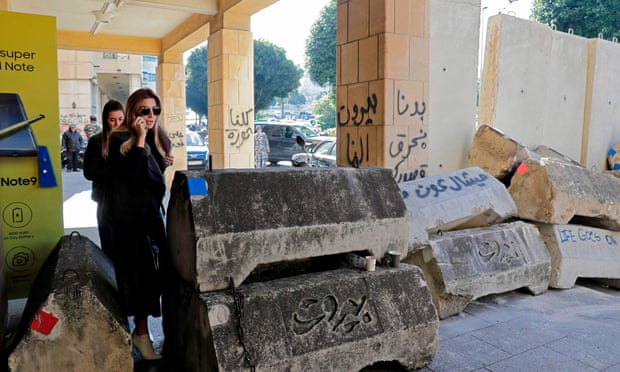In mid-December, a month and a half into protests that have crippled Lebanon and placed its political class in the dock, a priest caused a stir by telling his congregation to start stockpiling food.
The coming three years would be difficult, the cleric in the southern city of Sidon said. Citing the country’s Maronite Patriarch, he advised people to plant their own wheat. “His Holiness says the crisis will last for years, and famine is approaching.”
The words were quickly seized on by some who saw the sermon as fearmongering, and others who viewed it as a salient warning, as an economic collapse unlike anything since the Lebanese civil war.
Fragile even in a good year, Lebanon’s economy is disintegrating at an alarming rate, sparking a currency devaluation, a mass flight of money, restrictions on withdrawals, a grave threat to the country’s banking system and a guarantee that – without a foreign bailout – the country will default on its enormous debts by March at the latest.
The extent of the economic collapse was on show across the country in the lead-up to Christmas, with close to 400 restaurants closing, malls that usually teemed with expatriates home for the holidays empty and local businesses reporting a plunge in trade of up to 80%.
Rumblings of a looming abyss were part of the reason huge crowds of Lebanese took to the streets from 17 October, demanding an overhaul of a political class that had presided over nearly 30 unstable postwar years, while gaining fortunes funded largely by state funds.
So stark has the situation become that Lebanese who took to the streets – railing initially against a tax on the messaging application WhatsApp – have kept coming back. “There’s more to lose by going home,” said Fadi Abdullah, a student from Tripoli at a makeshift protest site in downtown Beirut. “This is either the end, or it’s the beginning. But at least we were all really Lebanese for a while.”
Citizenship has been a defining feature of the protests that have seen sect and ethnicity, usually dominant in Lebanon, relegated to lesser concerns as thousands of national flags take the place of political and militia banners.
Western governments keenly backed the protests, using the momentum to call for an end to patronage networks that greased the wheels of one of the world’s most indebted and corrupt nations, but the power of the street has run headlong into a system so invested in entrenched graft and incompetence that its very survival depended on keeping it going.
The euphoria of a cross-sectarian civil uprising has now given way to fears that the standard bearers of the status quo are willing to plunge the country into further crisis.
Political parties that had pledged to bow to demands have begun to dig in while calls for a new cabinet of technocrats to take control of the levers of power have stalled.
Paris, whose residual influence in the Middle East remains projected through Lebanon, remains tightly focused on reforms that could unlock more than $11bn (£8.4bn) in development money and has seen its demands for transparency to be introduced to state institutions ignored.
“Can you believe they’re not going for this,” asked a senior Lebanese banker. “That shows the depth of failure. The corrupt here and now is better than a rescue.
“How did we lose our way like this?”
Lebanon’s other traditional backers are disinclined to help without fundamental reforms. The US and Saudi Arabia have largely conditioned any help on Iran-backed Hezbollah being defanged in a country where it holds sway over the political process, feeding off the state economy, while at the same time generating its own revenues.
The US’s “maximum pressure” policy towards Iran is also affecting Lebanon. “The Americans have told us we can sink into the sea as long as Hezbollah remains powerful,” said one Lebanese leader.
Feudal lords and leaders of political blocs, including Druze officials and powerful militia, Hezbollah, have begun stockpiling food, while warning that a nationalistic spirit so vividly on display could be splintered by renewed sectarianism if and when times get tougher.
“Hezbollah … is trying to prepare its community against the challenges on two fronts; first, an attempt to increase local production of food, through agriculture and animal farming. And secondly, through securing the international roads linking their community’s regions to Syria,” said Mohanad Hage Ali, communications director of the Carnegie Institute in Beirut. “I have heard multiple reports of political parties storing food, in preparation for the upcoming crash.
“As the private sector is increasingly devastated due to the political impasse and capital controls including on imports, a humanitarian crisis is looming.”
Cash inflows to Lebanon have all but stopped, and bank staff are being harangued daily by customers demanding to exceed withdrawal limits of between $200-$300 per week. More was allowed to be taken out in the local Lebanese lira, but it had devalued by up to 25% against the dollar, and could not be taken abroad.
Albert Letayf, a Beirut-based executive, said an international rescue was needed. “The financing of the large trade deficit has always been provided by wealthy Lebanese, expatriates or residents, sending their money back home. You cannot fool them anymore, no revenues are coming whatsoever.”
On Beirut’s waterfront, however, the spirit of October has not yet given way to despair for some. “We all know what’s at stake,” said Amal Haadna, 23, wearing a sombrero emblazoned with the Lebanese flag. “Even the thieves among us know they have to change. We’ll go through heartache, but we’ll get there. The country hinges on this moment.”








































admin in: How the Muslim Brotherhood betrayed Saudi Arabia?
Great article with insight ...
https://www.viagrapascherfr.com/achat-sildenafil-pfizer-tarif/ in: Cross-region cooperation between anti-terrorism agencies needed
Hello there, just became aware of your blog through Google, and found ...